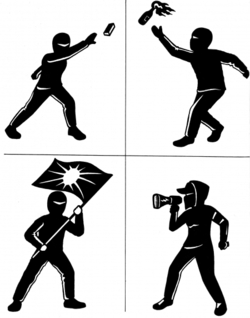The many faces of the G20 protests
At the G20 protests, get set for political confusion, surprises, and problems recognizing the players
By Ellie Kirzner
The G-20’s coming on pretty quickly — probably before activists can finish their diversity of tactics polemics.
From June 18 to 27, T.O turns into a global protest spectacle and every group with every issue and every possible concept of what demonstrating is about, will be fully engaged.
Somewhere around mid June, guaranteed, a lot of progressives in this city are going to start to feel they can no longer actually follow the demo action. Get set for political confusion, surprises, and problems recognizing the players. Like who’re you gonna’ march, rally or hang with, anyway?

Luckily, there are choices — this is a full-spectrum mobilization. Basically there are two main organizing clusters, though they overlap. Here’s the state of resistance affairs at the moment.
The Toronto Community Mobilizing Network is operating as a funnel for alot, though not all, of the drama. They’re hosting an expected flood of out-of-towners, and are supporting themed demos from June 20 to 27 with a major Free the Streets, Community Day of Action on the 25th.
The group is, at present, trying to find a site for its convergence centre (think of it as a mixture of rec room and command op) and plans to serve up food, educational panels, strategy sessions, and art spaces, etc. “It’s the community we want [ultimately] to build,’’ Network spokesperson Syed Hussan tells me.
The Network sees itself as an enabler, not necessarily a homogenizer.
“We are supporting any community responding to our five principles,’’ says Hussan. (Think migrant justice, indigenous rights, climate justice, income equity, community control of resources and an end to war and occupation,).
“We want to create a space for different kinds of tactics that will be separated temporally and spatially from others. We’re not telling groups what tactics to use.’’
If I may be permitted to translate this: there’s so many differences among activists about what kinds of protests are useful and even acceptable, that the trick is to make sure everyone always knows in advance what’s going down so they can make informed choices about participation.
No doubt police and security forces are hankering for a little forewarning themselves, but Assed says the Network has a policy of not negotiating with police. The primary reason for this, he says, is “we’re not organizing, just scheduling and supporting’’ the actions of composite groups.
“Honestly,’’ he says, “there is no security concern, no need for millions in the security budget. Cops versus protesters is not the story. It’s not, police draw a line and we go fight it — we want to talk about the G-20 representing the richest people and how they save banks and not the globe’s people.’’
Besides the Network, there’s also the Peoples’ Summit, backed by the Canadian Labour Congress, Canadian Peace Alliance, Council of Canadians, Greenpeace, Oxfam Canada and others, which is hosting a three day conference, June 18-20 at Ryerson.
According to organizer Marya Folinsbee, there will be 80 different workshops, panels, films, skill share sessions, etc, including participation from African and Latin American activists.
“We want to create a collective vision, a voice for justice and democracy,’’ says Folinsbee, adding that the outcome will hopefully be a lasting alliance.
The group is also organizing a major march on June 26 — this is the happening making using of the officially-sanctioned Trinity Bellwoods protest space, though it might be the only one.
“Labour has taken leadership,’’ says the CLC’s Jeff Atkinson. “We do parades, strikes, demos and we have good relations with police. We’ve been meeting with them since March.’’
It’s all early info, of course, but I’m guessing the time is coming to make with the paper mache, collages and banners. We don’t often host the powerbrokers of the world in this town and I think we all might have a few things to say.
Source: http://www.nowtoronto.com/daily/story.cfm?content=174920



